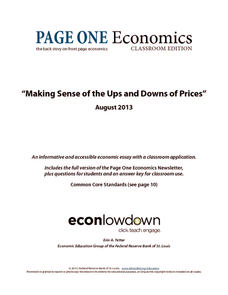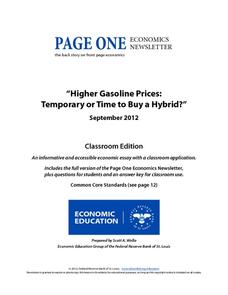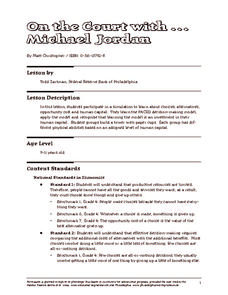Federal Reserve Bank
What Are the ‘Ingredients’ for Economic Growth?
Delve into the concept of economic growth with your class members, including why economic growth is important, what causes it, and how can countries encourage it.
Federal Reserve Bank
The Legacy of the Olympics: Economic Burden or Boon?
Do the economic benefits of major sporting events such as the Olympics or the World Cup outweigh the expected costs? Using fundamental economic terms, discover the explicit and implicit costs and benefits for countries that host these...
Federal Reserve Bank
Making Sense of the Ups and Downs of Prices
What are the consequences and costs of inflation? What is CPI, and how do we calculate it? This resource answers these questions in an organized and in-depth manner, and also includes a worksheet of follow-up questions designed for an...
Federal Reserve Bank
Higher Gasoline Prices: Temporary or Time to Buy a Hybrid?
Gasoline prices garner a lot of attention in the United States. What can explain a temporary decline in gasoline consumption, and how do gasoline prices spur innovation in the energy and automotive industries?
Federal Reserve Bank
Wait, Is Saving Good or Bad? The Paradox of Thrift
Could saving really harm the economy? Discover the paradox of thrift and how decreases in consumption can affect economic recovery and various markets and industries.
Federal Reserve Bank
Traditional Versus Shadow Banking
Here is a detailed breakdown of the traditional banking system, including the roles that intermediaries play as brokers and in making loans, as well as an introduction to the parallel system of shadow banking.
Federal Reserve Bank
Why Scarce Resources Are Sometimes Unemployed
Why do markets operate inefficiently when the world's resources are so limited? Review the various types of unemployment that exist and why some resources, especially human resources, go unused.
Federal Reserve Bank
Investing in Yourself: An Economic Approach to Education Decisions
What is the difference between physical capital and human capital, and in which should you invest? While considering the concept of return on investment, take a look at the payoffs and consequences of investing in training and education.
Federal Reserve Bank
Prices: The Marketplace’s Communication System
Explore the dual role of prices as signals and incentives, and discover how prices are determined by buyers and sellers in the United States economy.
Federal Reserve Bank
The Output Gap: A‘Potentially’ Unreliable Measure of Economic Health?
How can we accurately estimate what the economy should produce now and in the future? Have your pupils tackle this question as they learn about real versus potential GDP and as they review data regarding the output gap in the United States.
Federal Reserve Bank
Choices Are Everywhere: Why Can’t We Just Have It All?
Here is a resource covering a range of terms and concepts regarding scarcity, opportunity cost, and government debt in economics.
Federal Reserve Bank
“Dewey Defeats Truman”: Be Aware of Data Revisions
Discover the impact and importance of data releases about current economic conditions in the United States. Your class members will learn about data revision and the GDP, and how these figures can alter people's views on the economy.
Federal Reserve Bank
On the Court with... Michael Jordan
Pupils learn foundational economic concepts and consider the importance of decision-making, how to evaluate choices and alternatives, and the benefits of consistent training and practice by learning about the early life of Michael Jordan.
Federal Reserve Bank
Saturday Sancocho
What does stew have to do with bartering? Learners will find out how by reading the story Saturday Sancocho, discussing the text, participating in a bartering activity in class (once with goods only and once with money), and discussing...
Federal Reserve Bank
Savvy Savers
What are the benefits and risks of saving in an interest-bearing account? Pupils explore concepts like risk-reward relationship and the rule of 72, as well as practice calculating compound interest, developing important personal finance...
Federal Reserve Bank
To Rent-to-Own or Not to Rent-to-Own?
Explore the key elements of a contract with your young adults, and delve into the features and unique benefits of a rent-to-own contract through discussion and worksheet practice.
Practical Money Skills
Budgeting Your Money
How do you make sure that your income doesn't disappear before you have a chance to save it? Use a creative budgeting activity to teach learners in both special education and mainstream classes how to keep track of their expenditures and...
Council for Economic Education
A Penny Saved
A penny saved is a penny earned! Scholars research the different ways to save money over a lifetime. They investigate the Rule of 72, compound interest, and sub-prime loans to gain an understanding of how banks aid in the saving process....
Curated OER
Demand and Supply—It’s What Economics Is About!
In this economics lesson, students examine the principle of supply and demand related to the oil market as they identify factors that cause curves and shifts and determine equilibrium. Upper graders read an informational article and use...
Curated OER
Theodore "Teddy" Roosevelt
It's fun to learn about an interesting figure. Share the youth, career, presidency, and conservationism of Theodore Roosevelt with your class. Slides provides very simple text alongside wonderful images to tell the story of a charismatic...
Curated OER
Intelligence in the Internet Age
Does technology affect our intelligence? Stefanie Olsen's article, "Intelligence in the Internet Age," and the thought provoking reading comprehension questions that follow, are sure to generate a lively discussion.
Federal Reserve Bank
FRED in the Classroom: Measures of Inflation
Don't just tell class members about how to measure inflation, have them experience it firsthand by asking them to work with real data and construct graphs!
Federal Reserve Bank
FRED in the Classroom: Employment and the Labor Force
Acquaint your class members with data sources for employment in the United States and help them gain a better understanding of a vital measure of our economy's health.
Federal Reserve Bank
Measuring the Great Depression
Young historians examine the cost of goods and services through the Consumer Price Index (CPI), output measured by Gross Domestic Product (GDP), and unemployment measured by the unemployment rate to gain an understanding of the economic...

























